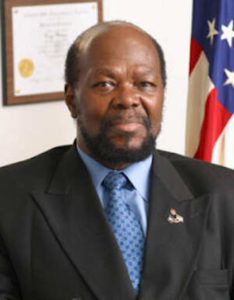
Roy Innis
*Roy Innis was born on June 6, 1934. He was a Black activist and politician.
Roy Emile Alfredo Innis was born in Saint Croix, U.S. Virgin Islands, in 1934. In 1947, Innis moved with his mother to New York City, where he graduated from Stuyvesant High School in 1952. Innis joined the U.S. Army, and at age 18, he received an honorable discharge. He entered a four-year program in chemistry at the City College of New York.
He held positions as a research chemist at Vick Chemical Company and Montefiore Hospital. Innis joined CORE's Harlem chapter in 1963. In 1964, he was elected Chairman of the chapter's education committee and advocated community-controlled education and Black empowerment. In 1965, he was elected Chairman of Harlem CORE, after which he campaigned to establish an independent Board of Education for Harlem. In early 1967, Innis was appointed the first resident fellow at the Metropolitan Applied Research Center (MARC), headed by Dr. Kenneth Clark.
In the summer of 1967, he was elected Second National Vice-Chairman of CORE. Innis was elected National Chairman of CORE in 1968 and initially headed the organization in a strong campaign of Black nationalism. According to James Peck, White CORE activists were removed from CORE in 1965 as part of a purge of whites from the movement, then under the control of Innis. Under Innis' leadership, CORE supported the presidential candidacy of Richard Nixon in 1972. This was the beginning of a sharp, rightward turn in the organization. Innis co-drafted the Community Self-Determination Act of 1968 and garnered bipartisan sponsorship of this bill by one-third of the U.S. Senate and over 50 congressmen. This was the first time in U.S. history that any civil rights organization drafted and introduced a bill to the United States Congress.
In the debate over school integration, Innis offered an alternative plan of community control of educational institutions. As part of this effort, in October 1970, CORE filed an amicus curiae brief with the U.S. Supreme Court in connection with Swann v. Charlotte-Mecklenburg Board of Education (1971). Innis and a CORE delegation toured seven African countries in 1971. He met with several heads of state, including Kenya's Jomo Kenyatta, Tanzania's Julius Nyerere, Liberia's William Tolbert, and Uganda's Idi Amin, who was awarded life membership of CORE. Innis met with Amin and the aforementioned African statesmen as part of his CORE campaign drive for finding jobs in Africa for Black Americans. In 1973, he became the first American to attend the Organization of African Unity (OAU) in an official capacity.
In 1973, his scheduled televised debate with Nobel-winning physicist William Shockley on Black intelligence was pulled at the last moment. This was because the student society at Princeton University organizing the event refused to allow the press and the public into the event. Innis was long active in criminal justice matters, including the debate over gun control and the Second Amendment. After losing two sons to gun violence, he became an advocate for the rights of law-abiding citizens to use self-defense.
He was a Life Member of the National Rifle Association and served on its governing board. Innis also chaired the NRA's Urban Affairs Committee and was a member of the NRA Ethics Committee, and continued to speak publicly in the US and around the world in favor of individual civilian ownership of firearms, gun issues, and individual rights. He told Newsday in 1993, "My sons were not killed by the KKK or David Duke. They were murdered by young, black thugs. I use the murder of my sons by black hoodlums to shift the problems from excuses like the KKK to the dope pushers on the streets."
Innis was noted for two on-air fights in the middle of TV talk shows in 1988, The Morton Downey, Jr. Show, and Geraldo. Innis raised American volunteers to fight for UNITA, an Angolan rebel army fighting the communist government. Uganda and apartheid-era South Africa also supported UNITA. Prosperity USA, a non-profit run by aides of presidential candidate Herman Cain, attracted controversy after it gave a $100,000 donation to CORE shortly before Cain's speech at a CORE event. In 1986, Innis ran in the Democratic primary for the 12th Congressional District, representing Brooklyn, and lost by a three-to-one margin. In 1993, New York City Democratic Party mayoral candidate, he challenged incumbent David Dinkins. He explained that "the Democratic Party is the only game in town. It's unfortunate that we have a corrupt one-party, one-ideology system in New York City, and I'd like to change that. But being a Democrat doesn't mean you have to be a fool."
Innis lost to Dinkins, who then lost to Giuliani in the general election. In 1998, Innis joined the Libertarian Party and seriously considered running for Governor of New York as the party's candidate that year. He ultimately decided against running, citing time restrictions related to his duties with CORE. Innis served as New York State Chair in the 2000 presidential campaign of Alan Keyes. He was the National Chairman of the Congress of Racial Equality (CORE) from 1968 until his death. One of his sons, Niger Roy Innis, serves as the National Spokesman of the Congress of Racial Equality. Roy Innis died on January 8, 2017, at the age of 82, from Parkinson's disease.